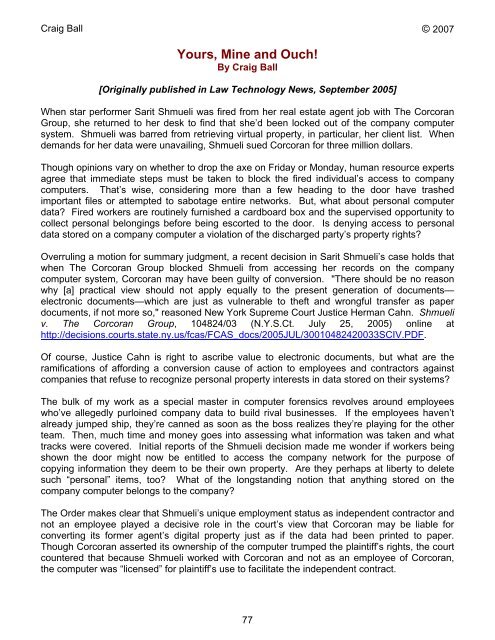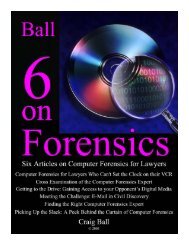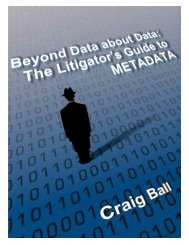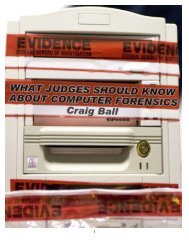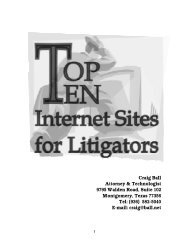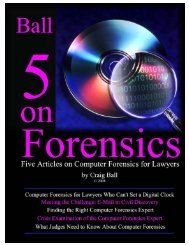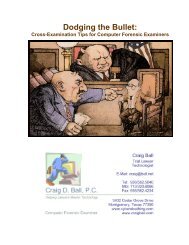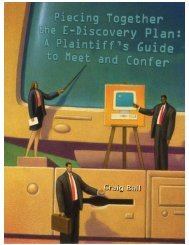Six Articles on Electronic - Craig Ball
Six Articles on Electronic - Craig Ball
Six Articles on Electronic - Craig Ball
You also want an ePaper? Increase the reach of your titles
YUMPU automatically turns print PDFs into web optimized ePapers that Google loves.
<strong>Craig</strong> <strong>Ball</strong> © 2007<br />
Yours, Mine and Ouch!<br />
By <strong>Craig</strong> <strong>Ball</strong><br />
[Originally published in Law Technology News, September 2005]<br />
When star performer Sarit Shmueli was fired from her real estate agent job with The Corcoran<br />
Group, she returned to her desk to find that she’d been locked out of the company computer<br />
system. Shmueli was barred from retrieving virtual property, in particular, her client list. When<br />
demands for her data were unavailing, Shmueli sued Corcoran for three milli<strong>on</strong> dollars.<br />
Though opini<strong>on</strong>s vary <strong>on</strong> whether to drop the axe <strong>on</strong> Friday or M<strong>on</strong>day, human resource experts<br />
agree that immediate steps must be taken to block the fired individual’s access to company<br />
computers. That’s wise, c<strong>on</strong>sidering more than a few heading to the door have trashed<br />
important files or attempted to sabotage entire networks. But, what about pers<strong>on</strong>al computer<br />
data? Fired workers are routinely furnished a cardboard box and the supervised opportunity to<br />
collect pers<strong>on</strong>al bel<strong>on</strong>gings before being escorted to the door. Is denying access to pers<strong>on</strong>al<br />
data stored <strong>on</strong> a company computer a violati<strong>on</strong> of the discharged party’s property rights?<br />
Overruling a moti<strong>on</strong> for summary judgment, a recent decisi<strong>on</strong> in Sarit Shmueli’s case holds that<br />
when The Corcoran Group blocked Shmueli from accessing her records <strong>on</strong> the company<br />
computer system, Corcoran may have been guilty of c<strong>on</strong>versi<strong>on</strong>. "There should be no reas<strong>on</strong><br />
why [a] practical view should not apply equally to the present generati<strong>on</strong> of documents—<br />
electr<strong>on</strong>ic documents—which are just as vulnerable to theft and wr<strong>on</strong>gful transfer as paper<br />
documents, if not more so," reas<strong>on</strong>ed New York Supreme Court Justice Herman Cahn. Shmueli<br />
v. The Corcoran Group, 104824/03 (N.Y.S.Ct. July 25, 2005) <strong>on</strong>line at<br />
http://decisi<strong>on</strong>s.courts.state.ny.us/fcas/FCAS_docs/2005JUL/30010482420033SCIV.PDF.<br />
Of course, Justice Cahn is right to ascribe value to electr<strong>on</strong>ic documents, but what are the<br />
ramificati<strong>on</strong>s of affording a c<strong>on</strong>versi<strong>on</strong> cause of acti<strong>on</strong> to employees and c<strong>on</strong>tractors against<br />
companies that refuse to recognize pers<strong>on</strong>al property interests in data stored <strong>on</strong> their systems?<br />
The bulk of my work as a special master in computer forensics revolves around employees<br />
who’ve allegedly purloined company data to build rival businesses. If the employees haven’t<br />
already jumped ship, they’re canned as so<strong>on</strong> as the boss realizes they’re playing for the other<br />
team. Then, much time and m<strong>on</strong>ey goes into assessing what informati<strong>on</strong> was taken and what<br />
tracks were covered. Initial reports of the Shmueli decisi<strong>on</strong> made me w<strong>on</strong>der if workers being<br />
shown the door might now be entitled to access the company network for the purpose of<br />
copying informati<strong>on</strong> they deem to be their own property. Are they perhaps at liberty to delete<br />
such “pers<strong>on</strong>al” items, too? What of the l<strong>on</strong>gstanding noti<strong>on</strong> that anything stored <strong>on</strong> the<br />
company computer bel<strong>on</strong>gs to the company?<br />
The Order makes clear that Shmueli’s unique employment status as independent c<strong>on</strong>tractor and<br />
not an employee played a decisive role in the court’s view that Corcoran may be liable for<br />
c<strong>on</strong>verting its former agent’s digital property just as if the data had been printed to paper.<br />
Though Corcoran asserted its ownership of the computer trumped the plaintiff’s rights, the court<br />
countered that because Shmueli worked with Corcoran and not as an employee of Corcoran,<br />
the computer was “licensed” for plaintiff’s use to facilitate the independent c<strong>on</strong>tract.<br />
77


